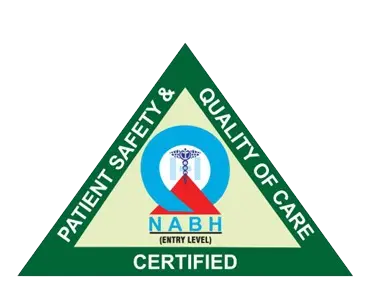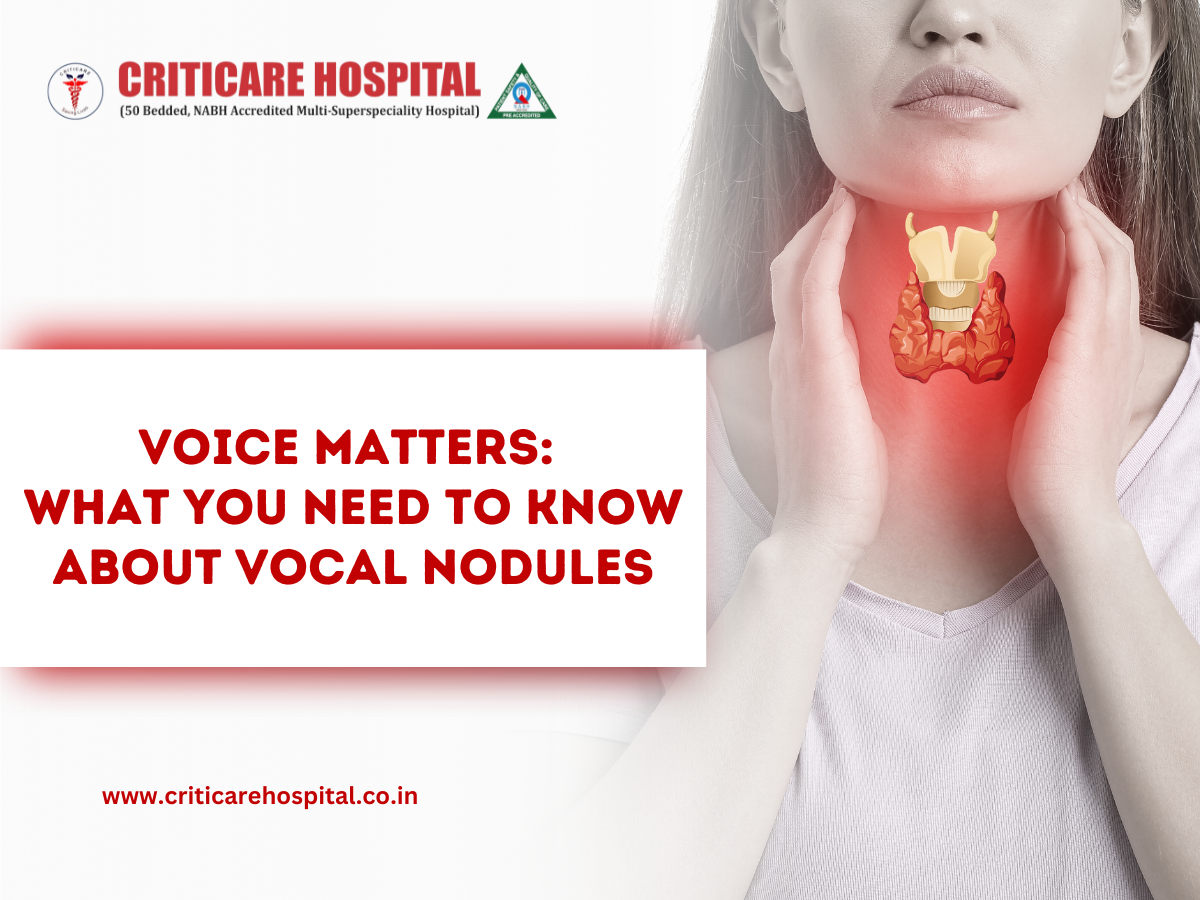CritiCare Hospital Lucknow feels that the voice is beyond just sound; it is an identity and a bridge to connect with people and, often, the heart of a person’s career. Whether you are a teacher, singer, salesperson, or just someone who loves to chat, the voice plays an integral part in daily life. A hoarse, strained, or even silent voice can be truly frustrating and concerning in cases like vocal nodules.
This blog intends to take you through everything about vocal nodules: what they are, why they appear, their symptoms, possible methods of treatment, and tips to avoid them. Together, let’s save the power of your voice.
What Are Vocal Nodules?
Vocal nodules, sometimes known as singer’s or screamer’s nodules, are benign growths that develop on the vocal cords. They behave like calluses that develop on both cords whenever there is repeated voice abuse or trauma.
Imagine rubbing your hands together repeatedly; after some time, you will have calluses. In the very same manner, repeated strain causes a swelling or thickening of the soft tissue of the vocal cords, which appears as nodules.
Who Is at Risk?
Anybody can become a victim of vocal nodules; however, they are particularly common in:
- Professional voice users include singers, teachers, public speakers, call centre agents, and actors.
- Children who are especially vocally expressive and perhaps sigh, scream, or shout frequently.
- People with certain habits-such as speaking loudly in noisy environments, clearing their throats frequently, or speaking for several hours straight without rest.
- Underlying Medical Conditions-Acid reflux, allergies, and chronic sinus issues can increase these risks.
What Causes Vocal Nodules?
Vocal nodules form mostly in cases of vocal abuse or misuse, such as
- Excessive shouting or screaming
- Speaking in a pitch too high or too low for too long
- Poor singing technique
- Chronically coughing or clearing one’s throat
- Speaking for extended periods without adequate hydration
- Sometimes irritants such as cigarette smoke or allergens should be added to the list!
Symptoms of Vocal Nodules
Vocal nodules are slow; the symptomatology develops very gradually. Early symptoms are often ignored. The onset of early symptoms must be understood and taken for detection.
- Hoarseness or raspy voice
- Breathiness or a “rough” quality in the voice
- Voice fatigue (the voice tires quickly or fades after talking)
- A feeling of a “lump” in the throat
- Frequent throat clearing or coughing
- Loss of vocal range (especially in high notes for singers)
- Difficulty projecting the voice
- Vocal pain after speaking or singing
If such Symptoms prevail for two weeks, an appointment with an ENT and voice therapy expert should be sought.
Acute Diagnosis for Vocal Nodules
At CritiCare hospital, the diagnosis is done via history-taking, assessment by voice, and viewing the vocal cords.
- Laryngoscopy: The throat is often examined using a flexible or rigid camera to visualize the vocal cords. Nodules appear as swellings symmetrically placed on both vocal cords.
- Videostroboscopy: This is a further investigation that utilizes a strobe light to slow down the vibration of the vocal cords so that how they move during speech or singing is seen very clearly.
- Voice Evaluation: The speech pathologist (SLP) might carry out some voice-related tests that measure pitch, tone, volume, or breath control.
Early diagnosis is crucial. Left unattended, vocal nodules become hard and produce permanent vocal changes or more serious complications.
Treatment of Vocal Nodules
The good news: Most cases of vocal nodules do not call for surgery. Treatment is usually a combination of voice therapy, behavioural modifications, and treating the root causes.
- Voice Therapy- Voice therapy is the central treatment modality for vocal nodules. The objective would be to retrain the voice and reduce damaging vocal habits with the guidance of a speech-language pathologist. It might include:
- Technique for proper breath support
- Exercises for resonance
- Education in vocal hygiene
- Reduction of throat clearing and straining
- Voice therapy is most effective when applied early.
- Medical Treatment- Where contributing factors such as acid reflux or allergies exist, they will be managed alongside voice therapy. Therapies may include:
- Antacids or proton pump inhibitors (for reflux)
- Antihistamines (for allergies)
- Nasal sprays (for sinus congestion)
- Vocal Rest- Avoidance of vocalizations through speaking or singing in the short term might help the cords heal better in some cases.
- Surgery- Surgery is rarely required for the removal of vocal nodules. Surgery is for large or long-standing nodules when voice therapy has failed and where the individual obviously relies heavily on vocal performance (e.g., an operatic singer).
Surgery involves microsurgical removal under the microscope with the aid of precision instruments. Voice therapy post-operation is still mandatory to ensure full recovery in the long term.
How Long Does Recovery Take?
Recovery depends on the severity of the nodules and your commitment to treatment. With voice therapy and vocal rest:
- Most people begin to notice improvement after 4–8 weeks.
- Full recovery can take anywhere from 2 to 3 months.
- Singers or professionals might need to be in therapy for longer to regain their performance level.
- Consistency has to be maintained. That is by following the instructions of your ENT doctor and voice therapist.
Prevention: How to Protect Your Voice
The prevention of vocal nodules is related to maintaining healthy voice habits — something we strongly educate at CritiCare Hospital’s ENT and Speech Therapy units.
Tips for voice care:
- Drink plenty of water to moisturize the vocal cords.
- Do not whisper; it strains the voice even more than speaking softly.
- Avoid straining your voice in big rooms during presentations by using a microphone.
- Warm up your voice before any singing or speaking activities, just like you warm up for a physical exercise.
- Avoid throat clearing; instead, take a sip of water and swallow.
- Try resting the voice if it feels hoarse or fatigued.
- Avoid smoking and exposure to tobacco smoke because they dry and irritate the vocal cords.
- Treat reflux and allergies; work with your doctor to manage these factors that can contribute.
- Give your voice some breaks, especially if it is being used a lot during the day.
- Seek help at the first signs of any persistent hoarseness.
When to See a Doctor
If you have been hoarse for more than two weeks, or if your voice feels tired, painful, or inconsistent, do not wait. At CritiCare Hospital Best Private Hospital in Lucknow, the ENT specialists work with voice therapists to provide full-spectrum care from diagnosis to recovery.
Conclusion
Though vocal nodules may sound insignificant, they can take much of a toll on your quality of life and career. The good news is that they are highly treatable, especially when picked early and treated optimally. If your voice is not the way it used to be, do not ignore anything related to you; it should be taken seriously. On this, the specialists at CritiCare Hospital are ready to help.




